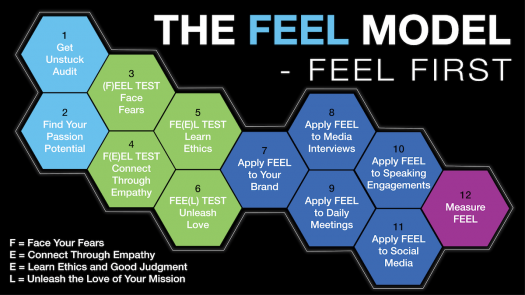
My peers in PR and marketing have asked me, why did you develop the FEEL First communications model?
Whether I’m on stage, in a small group setting, one-on-one, or hanging out with the Spin Sucks Community, I still have a big lump in my throat when I answer.
However, I believe it’s an important story to share.
Every time, I’ll say, “A 24-year old millennial put me on the road to FEEL.”
With passion, compassion, and yes, sorrow.
I share this story to educate other professionals in communications and in business.
My goal is to help you slow down and ignore the unimportant chatter.
It’s time to be present and open, and to explore a new model—the FEEL Model—as a road map to genuine relationships that bring meaning and impact into your work and your lives.
The FEEL Model: How It Began
In September 2018, after my 24-year old stepdaughter, Noelle, chose to end her journey with us, I stepped back to re-evaluate everything in my life and my work.
I had so many questions and I needed answers quickly.
I found myself wanting to speak with millennials every week so they could answer my questions.
These interviews marked the beginning of my 52+ week research study and passion project.
Here’s what I wanted to know from my millennial friends:
- How do you show up to your conversations?
- Are you being authentic when you share on social media?
- What do you value and how do you want to be perceived?
- What did you expect from the people you look up to such as the leaders in your lives?
- Which elements do you need to build trust in your relationships at work and online?
From all the answers and social media data intelligence I gathered using Talkwalker Quick Search, I learned very quickly that millennials want the people around them to FEEL.
What is the FEEL Model?

FEEL stands for:
- Face your Fears
- Engage with Empathy
- Use Ethics and Good Judgement
- Unleash Your Love
Millennials appreciate communication which is open and inclusive.
They value compassion and kindness and prefer empathetic people in their lives.
They are looking for leaders to be more transparent, ethical, and to exercise sound judgment, especially on social media. Millennials also expect professionals to match their passion and enthusiasm and take a stance supporting important causes, especially as they relate to their companies.
My research consisted of spending hours on the phone and Skype with millennials.
Initially, I thought these interviews would be brief (about 15 or 20 minutes).
I quickly found out that most millennials were happy to speak with me for 30 to 60 minutes.
Some wanted to chat for 90 minutes or more.
The stories were incredibly eye-opening, and at times, I wanted to reach through the phone and hug some of my interview subjects.
It’s Difficult to Know What People Truly Feel
From all the research, what stood out most is you don’t always know how people feel.
For this reason, it’s essential to show up to your conversations present, open-minded, with compassion (putting your emotional intelligence hat on and keeping it on), using your good judgment, and unleashing your energy if you want millennials to be your champions.
Of course, every real relationship has a foundation of trust.
The FEEL model helps you move from connection and simple transaction (the start of a relationship) to deeper interactions based on loyalty and advocacy.
Do You Know How Much You FEEL?
For this reason, my team and I have developed a test.
The FEEL First Test evaluates you on each part of the model.
Your score can range from a beginner who needs work, to the FEEL Mastery level which is the highest level you can attain.
After you take the test, you’ll receive an overall FEEL Model assessment, as well as a score for each bucket of FEEL (for Fear, Empathy, Ethics, Love).
The test also recommends exercises to increase FEEL in all areas of the model, and ways you can practice FEEL before you interact through any of your channels.
Here’s the premise behind the FEEL Model and test:
If you can FEEL first, then you’re more likely to tap into the mood and meaning of others when they communicate.
Ultimately, you will have a better understanding of the needs of people who matter the most to you.
At the same time, increasing FEEL will also help you develop trust in your relationships.
I’ll be focusing on my FEEL Model road map in 2020, adding FEEL to all of my communications.
At the same time, I’ll be helping other professionals understand why strategic communications can only get you so far when you connect and want to build genuine relationships.
Although FEEL started with millennials, it’s for all generations.
FEEL is human, and, in an age of marketing automation and AI, it separates us from the robots.
So now it’s time for you to see how much you FEEL in your communication.
You can find out with the FEEL First Test!
Editor’s note: Here’s a video recap of the conversation Deirdre had with our community on the #SpinSucksAMA.
Photo by Frederik Falinski on Unsplash